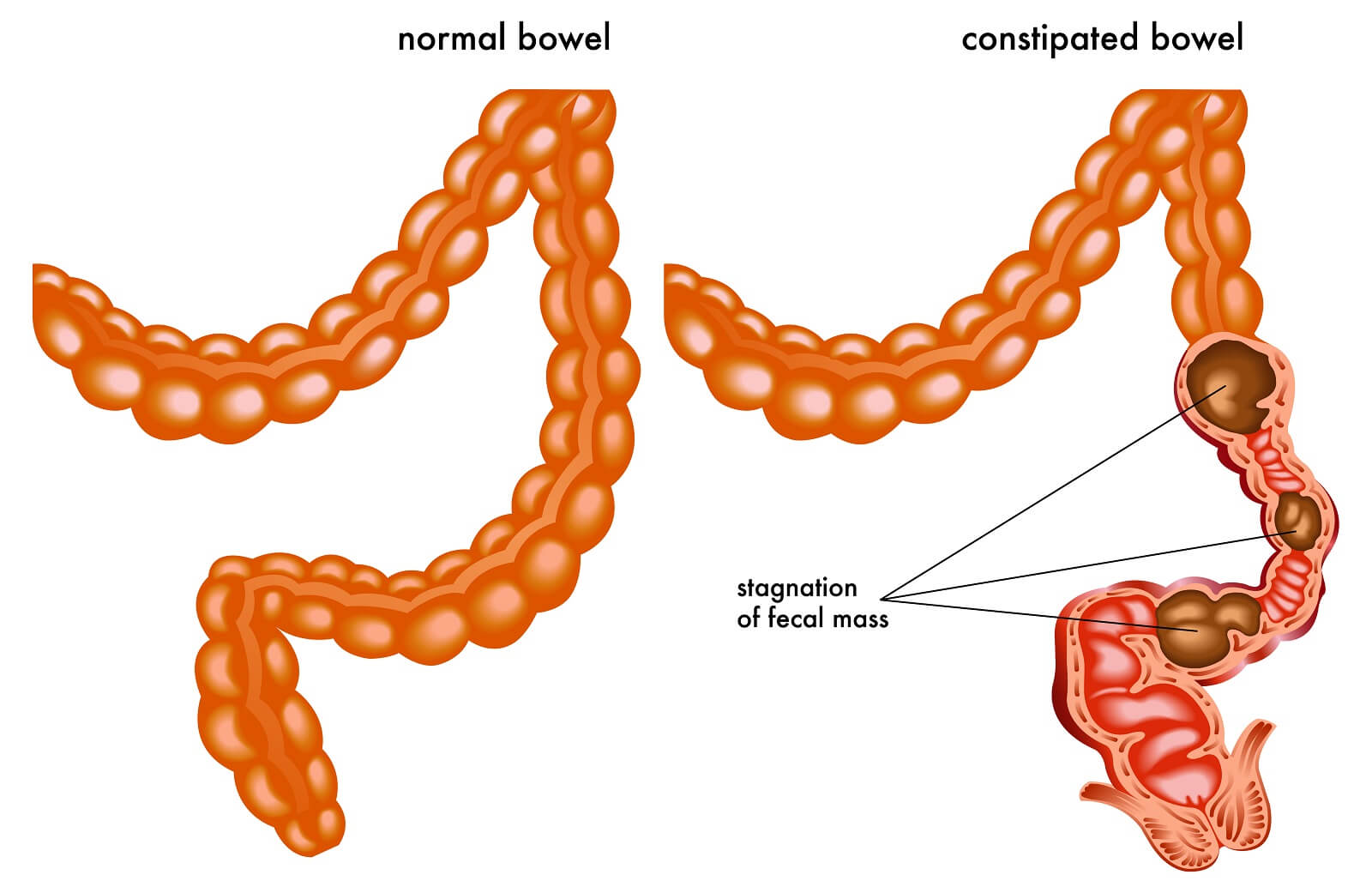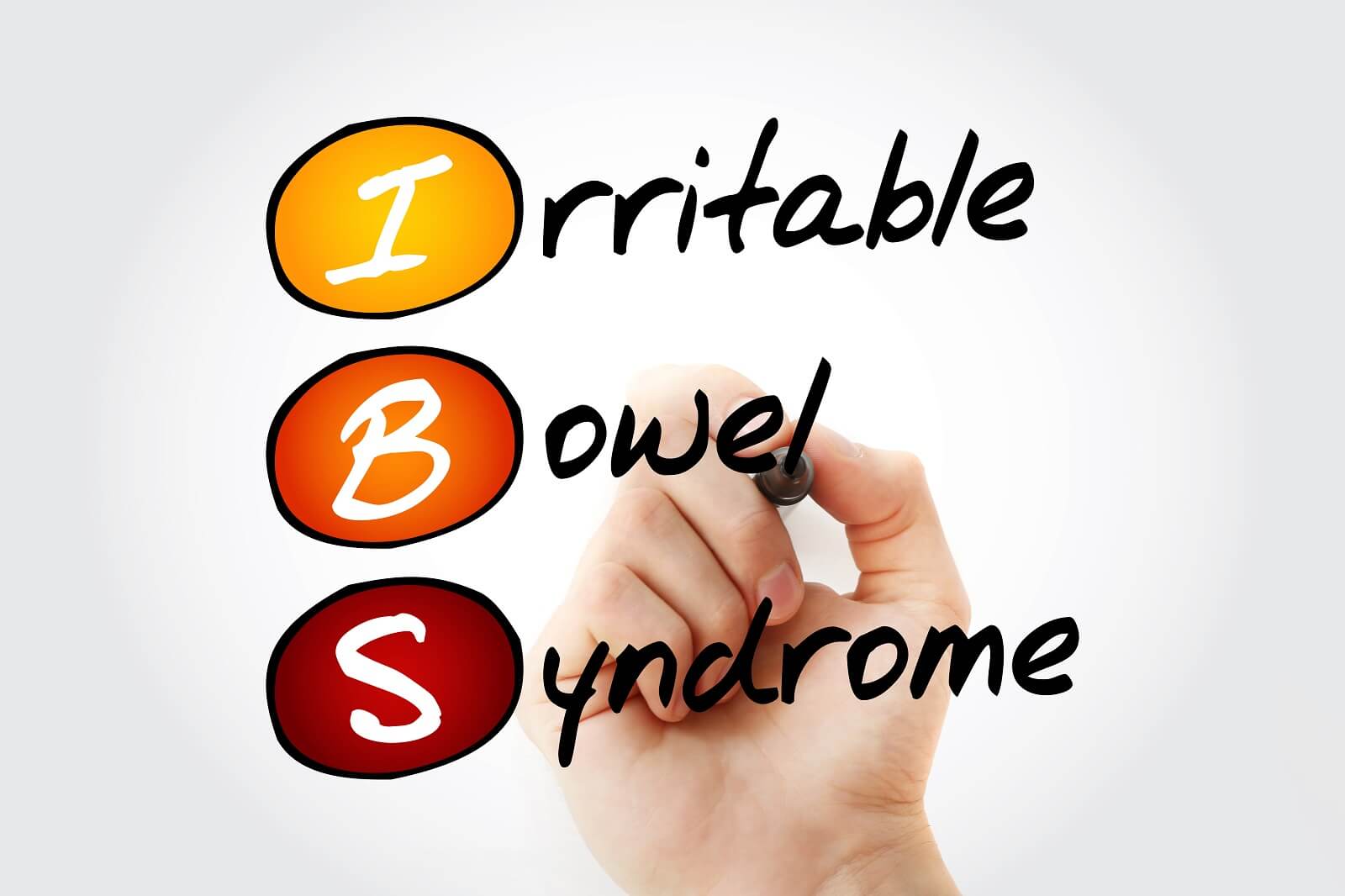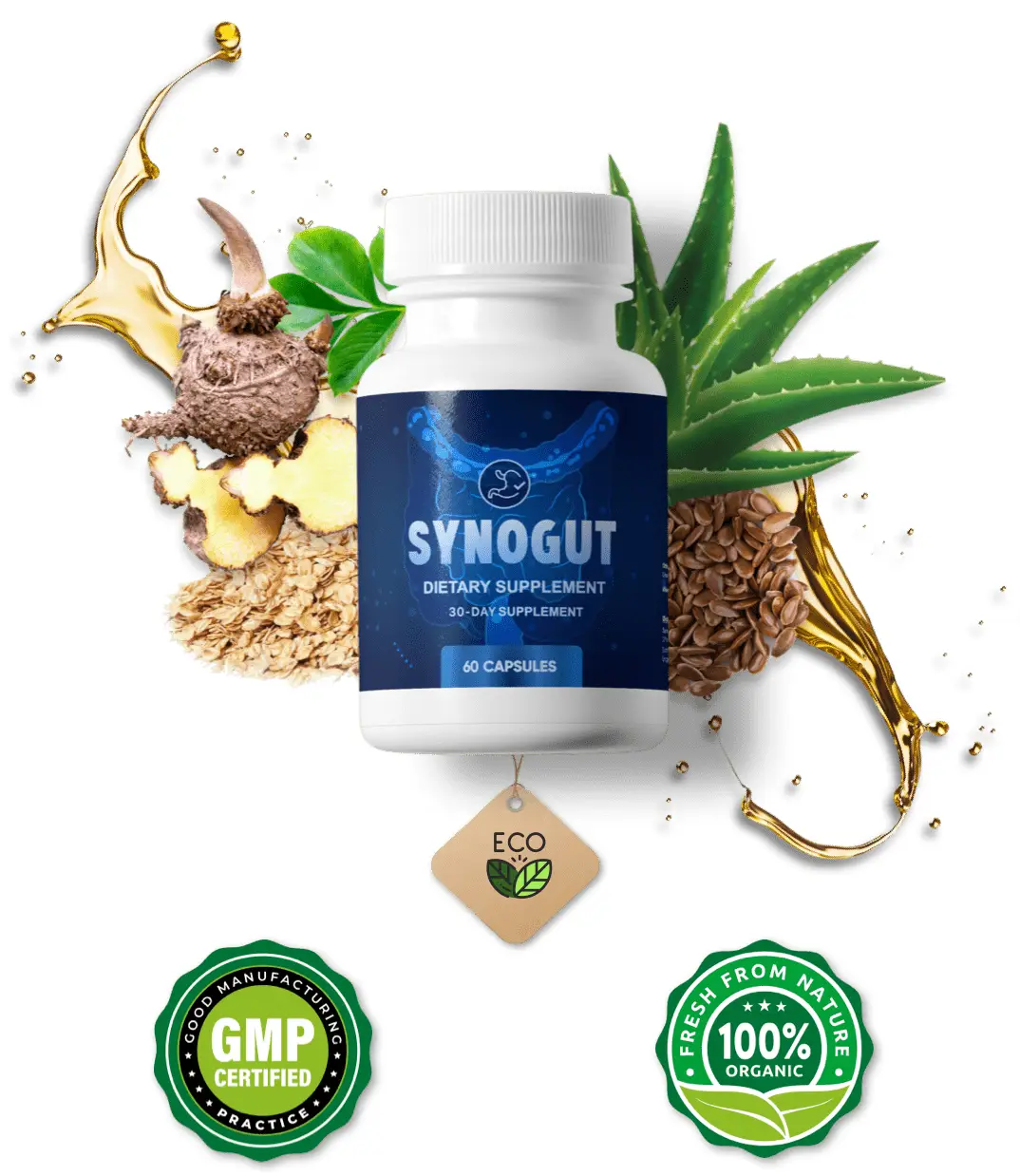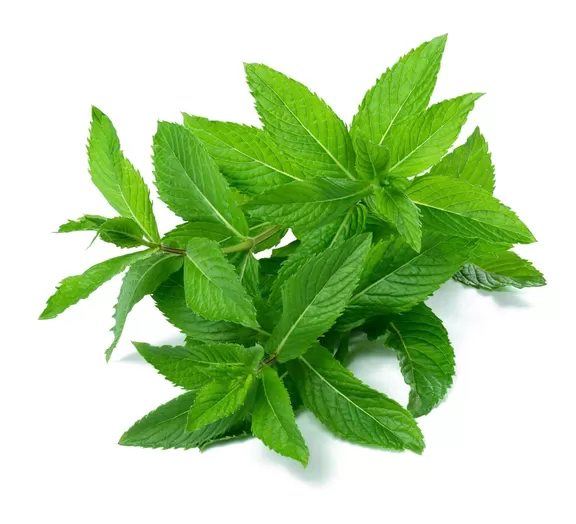
Peppermint (Mentha x piperita) is a popular herb, and does have a relaxing effect on the smooth muscles of the small intestine. But, is it a good choice when it comes to constipation? Research appears to show some different results, but it is probably safe to say that peppermint is not going to be a good choice for classic constipation (that is, constipation that is not related to other problems like irritable bowel syndrome).
It does seem that the menthol in peppermint, which is able to relax the smooth muscle tissue of the small intestines, could prolong the time it takes for material to pass through them. And, peppermint oil may also reduce the colon’s ability to contract and propel material through it.
In general, peppermint is not a herb of first choice when it comes to treating constipation. The caveat being it does help quite a bit for irritable bowel syndrome (IBS). Yet, IBS can present in three different ways: diarrhea predominant (IBS-D), constipation predominant (IBS-C) and a mixture of constipation and diarrhea (IBS-M). And, research does not appear to specifically address IBS-C and peppermint oil too much. Mostly, it is just focused on IBS of all kinds.
In Herbsey’s article on chamomile for constipation, the topic of smooth muscle relaxers assisting with constipation is addressed. And, research shows that smooth muscle relaxant drugs do not influence constipation.
So, just because peppermint can relax smooth muscles, one might think that this could help with constipation, but it probably doesn’t. If anything, it may aggravate a case of constipation because the intestines are not contracting and moving material as well as they could.
So generally, if you are thinking about peppermint to treat this condition, it would be wise to opt for a different herb. Nature has many other herbs to choose from to effectively mitigate and deal with constipation! There is no need to rely on an herb that may even have negative effects.
The only caveat being if you already have IBS. In that case, peppermint might be something to really consider for your overall bowel problems.
Samuel Bart’s Digestive Health Solution
Samuel Bart has always been passionate about plants and their ability to keep us healthy. He has put together some of the best natural ways that could help anyone support a healthy digestive system.
Samuel perfected an easy, yet powerful formula, which consists of amazing ingredients. Bart’s supplement is backed by a ironclad 60-day, money back guarantee.

Peppermint’s Effect on Constipation

A 2009 study about drug-induced constipation, published in the Adverse Drug Reaction Bulletin,(source 1) states that peppermint oil can aggravate constipation. Peppermint exerts its antispasmodic effect on intestinal smooth muscles due to menthol interfering with the movement of calcium across the cell membrane. This essentially reduces the movement of calcium ions into the cells. The result is that peppermint reduces intestinal motility through lessening the amplitude and frequency of contractions.
To further explain, contraction of the gastrointestinal smooth muscles is mainly regulated by intracellular calcium ion signaling. Contractile agonists (a chemical that binds with a cell receptor to produce an effect) raise the amount of calcium in a cell by causing calcium ion influx from outside the cell, and other methods. The end result of the intracellular reaction to more calcium is contraction.(source 2)
Thus, if calcium ions are inhibited from moving into the cell, this will result in less smooth muscle contraction; which hinders the movement of material through the intestines.
More light was possibly shed on this issue with menthol by a 2022 study in the British Journal of Clinical Pharmacology.(source 3) The goal of the study was to better understand how menthol affects the movement of material through the gut. And, menthol is an active component of peppermint essential oil.
The study employed 30 children aged 7 to 12 years that had abdominal pain, and used a wirelessly detected capsule to measure intestinal transit. The children were given three different dosages of menthol: 180 mg once a day, 180 mg twice a day, or three 180 mg doses each day. The dosage of menthol was done for one week.
Interestingly, the research found that transit time through the colon decreased as the dose of menthol increased (an inverse correlation). Transit time in other regions of the intestines was not affected by menthol. Yet, important to note, although the contractility of the colon was not affected by menthol, the stomach, small intestines, and whole gut contractility went up as the dose of menthol increased (a positive correlation).
Another study also discussed peppermint oil’s effect on intestinal transit. This study was published in 2003 in Alimentary Pharmacology & Therapeutics.(source 4) The study states that the time it took material to move from the mouth to the entrance of the colon was significantly prolonged by peppermint oil.
Guaranteed 24 Hour Constipation Relief
Dr. Scott McLeod, PharmD received his doctorate from the WSU College of Pharmacy. His book on constipation is guaranteed to show you how to get relief in 24 hours or less-or your money back (60 day, 100% refund guarantee).
Everything used in this plan is from nature. No use of harmful laxatives. People who have used these say they work BETTER than over-the-counter laxatives!

Peppermint and Irritable Bowel Syndrome

A review study, published in 2019 in BMC Complementary and Alternative Medicine,(source 5) looked at several studies to determine how peppermint oil would affect irritable bowel syndrome (IBS). After reviewing relevant studies, 12 randomized trials were selected to be included in the research. These 12 studies encompassed 835 patients who used peppermint oil for IBS.
The study found the relative risk for "global improvement in IBS symptoms" which was 2.39. Relative risk takes some explaining; but, essentially you can think about this as those who took peppermint oil were 2.39 times as likely to see global improvement of IBS symptoms.
The study also found that the relative risk for improvement in abdominal pain was 1.78. Therefore, taking peppermint oil made those who took it 1.78 times as likely to see improvement in this regard.
A 2020 study in Gastroenterology(source 6) tested peppermint oil which released in the small intestines and another version that released in the colon. The study involved 4 hospitals in the Netherlands, from August 2016 to March 2018; and 178 participants completed the study.
This study came to the following conclusions:
In a randomized trial of patients with IBS, we found that neither small intestinal-release nor [colon]-release peppermint oil (8 weeks) produced statistically significant reductions in abdominal pain response or overall symptom relief, when using FDA/EMA recommended endpoints. The small intestinal-release peppermint oil did, however, significantly reduce abdominal pain, discomfort, and IBS severity.
Gastroenterology [158.1 (2020): 123-136]
A 2018 review study, published in Alimentary Pharmacology & Therapeutics,(source 7) investigated peppermint oil’s use for IBS.
The review process evaluated research published through July of 2017, and only randomized placebo controlled trials were included for the evaluation of clinical disorders (e.g., IBS).
Relating to small intestine transit time, the review found that some research showed peppermint oil appeared to decrease the contractions of the small intestine. The study also reports that peppermint oil appears to reduce the contractions of the colon and/or the movement of material through the colon as well.
Concerning IBS, this review found that peppermint oil was a suitable treatment. Some of the concluding remarks are as follows:
Placebo controlled studies support [peppermint oil’s] use in irritable bowel syndrome, functional dyspepsia, childhood functional abdominal pain, and post-operative nausea though significant trial heterogeneity (eg, peppermint oil dose and formulation) exists. It appears to be safe with few, if any side effects beyond those seen with placebo.
Alimentary Pharmacology & Therapeutics [47.6 (2018): 738-752]
Naturally Treat Hemorrhoids in 48 Hours
Jessica Wright’s unique 5-step, all-natural approach to hemorrhoid treatment delivers permanent relief. Heal hemorrhoids in 48 hours, and eliminate the root cause in 30 to 60 days.
Benefit from Jessica’s 12 years of research; her book is backed by a 60 day, 100% money back guarantee.

The Potential Side Effects of Peppermint
Peppermint is a very safe herb, but there can be some complications when you use it; especially if you are using it at therapeutic doses or using the essential oil. Herbsey has an entiere article dedicated to this very topic. You can find it here: The Side Effects of Peppermint (and dosage guidelines).
Possibly one of the most common side effects that can occur when you take peppermint oil orally is heartburn. So if you have acid-reflux, or just want to avoid heartburn, make sure you take enteric-coated peppermint oil. This will help ensure the oil reaches the small intestines and survive the gastric acid of the stomach.
Other side effects include inducing menstruation, causing skin reactions, and possibly leading to certain oral conditions. Additionally, peppermint may interfere with how some drugs are metabolized by the body.
To be safe, make sure you read up on the potential hazards of using this herb before you start your treatment program.
Dr. John Herzog (MD)
Dr. John Herzog, a "survival surgeon" from Maine explains what home remedies work best in a crisis situation.
This may be important in the event you require first-aid or are in an emergency situation without easy access to a hospital. Dr. John Herzog has assembled a large collection of home remedies for such scenarios.

A Natural Digestive System Supplement that Helps

If you have been struggling with digestive problems like constipation, you should know about Samuel Bart. Mr. Bart lives with his wife, Alma, in Nashville, Tennessee.
Mr. Bart has always had a passion for plants and how to use them medicinally. He went on to research some of the most effective ways that could help people support a healthy digestive system.
To this end, Mr. Bart developed a product he calls “SynoGut.”
Every capsule of this supplement is made in the USA, in a FDA approved, and GMP certified, facility under sterile, strict, and precise standards. Synogut capsules are non-GMO. You can rest assured that they do not contain any dangerous stimulants or toxins, and more importantly, they are not habit forming.
His proprietary blend blend contains the following ingredients:
- Psyllium husk
- Bentonite clay
- Black walnut hull
- Oat bran
- Flaxseed
- Prune fruit
- Aloe vera leaf
- Lactobacillus acidophilus (a probiotic bacteria)
- Apple fruit pectin
- Glucomannan root
If this is not the first time you have had constipation, you might benefit from the power these natural items can provide. And, if you have had prolonged constipation, utilizing a supplement like Mr. Bart’s could help you become more regular—without an arsenal of prescription drugs.
Many people have tried synthetic drugs to solve their constipation issues; and if these didn’t work, it may be hard to invest in a natural remedy like SynoGut. To this end, Mr. Bart offers a 60 day, full refund guarantee on his supplement.
If you decide to invest in Mr. Bart’s supplement, and are not satisfied with the results, you can quickly request a refund. SynoGut will promptly refund your purchase; ensuring there is no risk to give Mr. Bart a chance.
SynoGut is sold via the large online retailer ClickBank—a company based in Boise Idaho, USA. ClickBank sells products across the world, and ensures you can get a refund if you are not satisfied with SynoGut’s results.
If you are in a situation where you have “tried everything,” SynoGut is worth the quick purchase and a solid test drive. If you would like to learn more about Samuel Bart’s SynoGut supplement, you can do so at the SynoGut website.
About the Author
Geoff Kent is a natural medicine enthusiast who has been researching and writing about natural medicine since 2008. Geoff is primarily a web developer, but also researches and authors written and video content about natural health. Geoff has a bachelor’s degree in Management Information Systems from the University of Northern Iowa.
More on Geoff KentImportant Disclosures & Disclaimers
It is important to use the information you find on Herbsey.com in the right way. Also for legal reasons, these disclaimers and disclosures are necessary. For further information about each, feel free to click the link provided to the page on this website that provides more information.
Medical Disclaimer
The information on this website is not a prescription for anyone. This information is for informational or educational purposes only, and is not a substitute for professional medical advice or consultations with healthcare professionals.
Advertisement Disclosure
Some of the links provided on this article and website are affiliate links. If you purchase a product after clicking on these links, Herbsey.com will earn a commission. Herbsey.com promotes various products through advertisement and text links. For more information: Our Advertisements.










